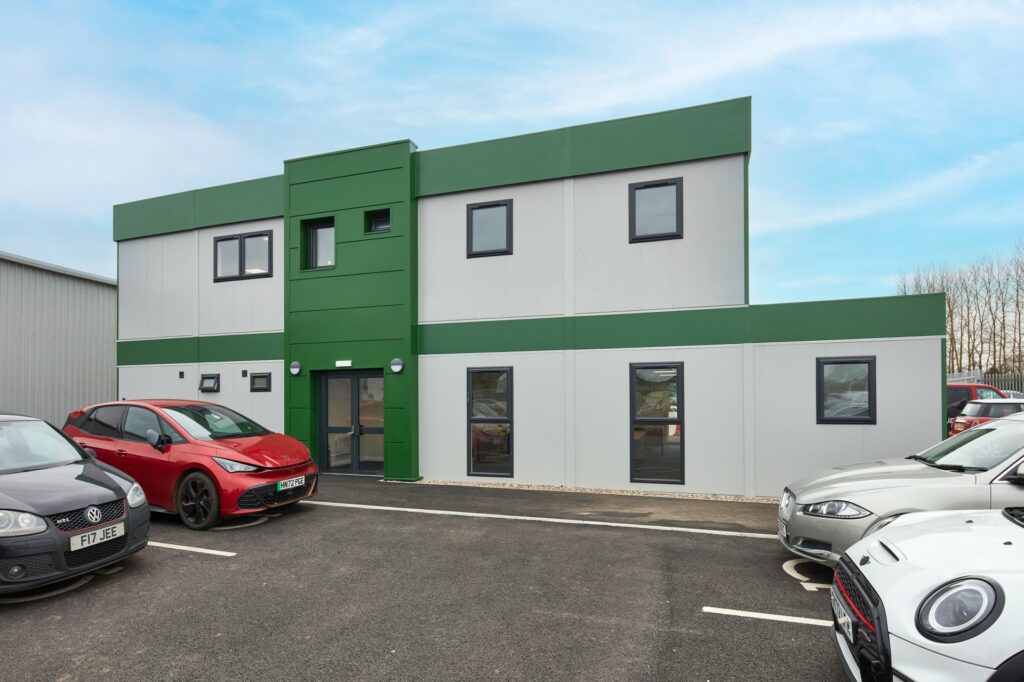The role of modular buildings in your expanding business
As a business develops, it requires a solid and reliable infrastructure in order for rapid growth to remain manageable. That’s...
Posted on 22nd April 2024 Contact Us
As a business develops, it requires a solid and reliable infrastructure in order for rapid growth to remain manageable. That’s where modular buildings come in, as they’re the perfect way to facilitate business expansion all while remaining cost-effective. No matter which sector you operate in, read on to discover the role of modular buildings in your expanding business.
Modular buildings in the B2B sector
Modular buildings offer significant advantages to B2B enterprises, enabling them to grow and thrive in an increasingly competitive marketplace.
Scalable infrastructure: Modular buildings provide businesses with scalable infrastructure solutions that can easily accommodate changing needs and growing operations. Whether it’s expanding office accommodation, adding production facilities or setting up distribution centres, modular buildings offer the adaptability to scale operations as demand fluctuates or new opportunities arise.
Rapid deployment: One of the key benefits of modular buildings for B2B businesses is their rapid deployment. Unlike traditional construction methods, which can take months or even years to complete, modular buildings can be quickly designed, manufactured and installed on-site. This accelerated timeline allows B2B organisations to seize opportunities, enter new markets, and respond swiftly to changing customer demands.
Cost-effective solutions: Modular buildings offer affordable solutions for businesses looking to expand their operations without breaking the bank. Through prefabricated components and streamlined construction processes, modular buildings reduce overall project costs, including labour, materials and time. This allows businesses to allocate resources more strategically, invest in innovation, or strengthen their profit margins.
Diversity of applications: Modular buildings can be customised to meet the specific needs and requirements of any business. They can be used for administrative offices, manufacturing facilities and workshops, storage facilities, dining facilities, toilets and shower blocks, bike hubs and much more. This gives businesses the freedom to tailor their modular buildings to optimise workflows, enhance productivity, and create environments that support their unique processes.

Modular buildings in the B2C and retail sectors
Our wide range of modular buildings plays a crucial role in supporting the retail sector by offering flexible and cost-effective solutions to various challenges faced by big-name stores and independent businesses alike. Below are several ways in which modular buildings benefit the retail industry.
Quick and flexible expansion: Modular buildings enable retailers to quickly expand their physical space to meet growing demand or seasonal fluctuations. Whether it’s for adding new product lines, accommodating increased foot traffic during peak periods or testing new markets with pop-up stores, modular buildings offer a flexible and scalable solution. With streamlined processes and shorter lead times compared to traditional construction methods, retailers can swiftly deploy modular buildings to capitalise on a wide range of business opportunities.
Cost-effective retail spaces: Modular buildings provide retailers with a very affordable alternative to traditional brick-and-mortar stores. Due to modular buildings using prefabricated components and streamlined construction techniques, retail businesses can reduce construction costs, minimise waste and optimise project timelines all in one go. This cost efficiency allows retailers to allocate resources more effectively, invest in other areas of their business, or pass on savings to customers through competitive pricing.
Temporary and mobile retail solutions: Modular buildings are well-suited for creating temporary or mobile retail spaces, such as pop-up shops, ticket booths, event kiosks and seasonal markets. These versatile structures can be easily transported, assembled and disassembled, allowing retailers to take their products directly to consumers in high-traffic locations or at special events. Temporary modular retail spaces also offer retailers the flexibility to experiment with new concepts, engage with customers in unique settings, and generate buzz around their brand.
Customised retail environments: Modular buildings can be customised to reflect the unique brand identity and design preferences of the retailer. From storefronts and display areas to fitting rooms and storage spaces, modular retail buildings can be tailored to meet specific requirements and create immersive shopping experiences for customers. Retailers have the flexibility to choose from a range of finishes, fixtures and layout configurations, as well as wraparound vinyl artwork that instantly catches the eye.
Modular buildings are a sustainable solution
As an added bonus, modular buildings offer a sustainable solution for businesses seeking to reduce their environmental footprint and adopt more eco-friendly practices. Below are several ways in which modular buildings enable businesses to expand quickly and effectively, all while remaining sustainable.
Reduced material waste: Modular construction involves prefabricating building components off-site in a controlled factory environment. This precision manufacturing process minimises material waste by optimising the use of resources, as well as reducing excess materials that are commonly generated in traditional construction projects. By creating less waste, modular buildings help businesses to conserve natural resources and greatly reduce the volume sent to landfill, contributing to a more sustainable building industry.
Energy efficiency: Modular buildings can be designed and constructed to meet high standards of energy efficiency. With advances in building technology and sustainable materials, modular buildings can incorporate features such as insulation, energy-efficient windows, LED lighting and HVAC systems that help to reduce energy consumption and lower utility costs. By optimising energy performance, modular buildings help businesses to decrease their carbon footprint and mitigate their impact on the environment.
Sustainable materials: From recycled and recyclable materials to renewable resources and low-impact manufacturing processes, modular buildings can be constructed using materials that minimise environmental impact. By choosing sustainable materials, businesses can support responsible sourcing practices and contribute to a more circular economy.
Reduced site disruption: Modular construction involves relatively little on-site disruption and construction-related disturbances compared to traditional building methods. Thanks to remote fabrication and assembly, modular buildings require less time and fewer resources to complete, resulting in shorter construction schedules and reduced disturbance to surrounding communities, ecosystems and habitats. By cutting down site disruption significantly, modular buildings help to preserve local environments and promote ecological balance.
Adaptability and reusability: Modular buildings are inherently adaptable and reusable, offering businesses the flexibility to repurpose or move their structures as needed. Whether it’s a case of expanding, downsizing or relocating operations, modular buildings can be disassembled, transported and reinstalled with minimal impact on the environment. This versatility extends the lifespan of modular buildings and alleviates the need for new construction, ultimately reducing resource consumption and promoting sustainable development.
Get in touch
We manufacture, supply and install a wide range of new, used and refurbished modular buildings for customers in every sector. To find out more about how we can support your expanding business, give our team a call today on 01482 656590 or use our contact form.



